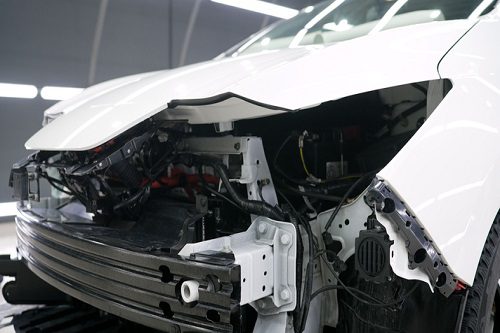5 key considerations when it comes to repairing EVs

Authored by NIG
Electric vehicles (EVs) are continuing to rise in popularity. According to latest data, there were around 850,000 fully electric vehicles on UK roads at the end of August 2023, and a further 530,000 plug-in hybrids. And this number is only likely to grow exponentially as we move nearer to the ban on new diesel and petrol cars, which has now been pushed back to 2035.
The prevalence of EVs is creating an opportunity for independent repairers to incorporate electric vehicle servicing into their business. However, it also brings challenges. It is essential that technicians are not only trained to EV standards, but that they also know how to make electrical systems safe in the workshop. The Institute of the Motor Industry (IMI) has recommended that repairers need to make the following considerations when it comes to EVs:
Understanding the different maintenance routinesUnderstanding the different electrical systemsIdentifying common faultsEnsuring safety at all timesLearning the right skills
It’s important to remember that having the right qualifications relating to EVs is not just a ‘nice to have’. There is a legal requirement under ‘The Electricity at Work Regulations 1989’ Act that all technicians are suitably qualified to work on EVs.
Employers allowing their employees to work upon EVs without possessing the necessary skills to do so could find themselves prosecuted under this legislation.
It is essential technicians have the correct skills and qualifications required to service and repair EVs from a recognised training body, such as the IMI.
Getting qualified
The IMI currently has over 200 approved training centres nationwide to deliver Hybrid / EV qualifications along with learning and development solutions to automotive professionals.
The following Electric Vehicle courses are available which will provide technicians with qualifications necessary for their role:
Level 1 Award in Electric / Hybrid Vehicle AwarenessLevel 2 Award in Electric / Hybrid Vehicle Routine Maintenance ActivitiesLevel 2 Award in Preparing Heavy Electric / Hybrid Vehicles for RepairLevel 2 Award in Electric / Hybrid Vehicle Hazard Management for Emergency and Recovery PersonnelLevel 3 Award in Electric / Hybrid Vehicle System Repair and ReplacementLevel 3 Award in Heavy Electric / Hybrid Vehicle System Repair and ReplacementLevel 4 Award in the Diagnosis, Testing, and Repair of Electric / Hybrid Vehicles and Components
For more information, please speak to your usual NIG contact.





